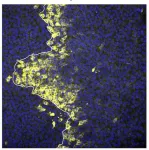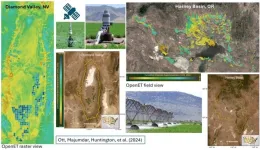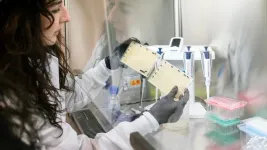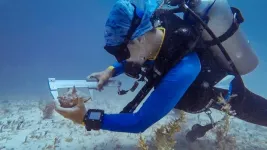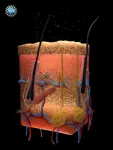(Press-News.org) WINSTON-SALEM, N.C. – September 5, 2024 — The Wake Forest Institute for Regenerative Medicine (WFIRM) is honored to announce its selection for a pioneering cancer research project that will take place aboard the International Space Station (ISS). The project, one of only five chosen through a competitive solicitation by the ISS National Lab in partnership with NASA, aims to explore the effects of microgravity on cancer development and treatment.
The project, led by Dr. Shay Soker, focuses on the use of organoids—miniature, simplified versions of organs grown in the lab from cells recovered from colorectal cancer patients. These organoids will be sent to the ISS to study how microgravity affects cancer growth and response to treatment, offering insights that could revolutionize cancer therapies here on Earth.
“Being selected for this project is an incredible honor and opportunity for our team at WFIRM,” said Dr. Soker. “The microgravity environment of the ISS provides a unique setting to study cancer in ways that are not possible on Earth. This research has the potential to unlock new understandings of cancer behavior and lead to more effective treatments.”
The ISS National Lab, in collaboration with NASA, seeks to harness the power of space-based research to benefit life on Earth. The selected projects are at the forefront of scientific exploration and innovation, pushing the boundaries of what is possible in cancer research.
“This selection underscores WFIRM’s commitment to pushing the boundaries of scientific research and finding innovative solutions to some of the world’s most challenging health issues,” said Dr. Anthony Atala, Director of Wake Forest Institute for Regenerative Medicine and co-lead for the grant. “Conducting this research in the microgravity environment of the ISS offers us a rare opportunity to gain a deeper understanding of cancer, with the ultimate goal of improving patient outcomes here on Earth.”
The implications of this research extend far beyond the ISS. By studying cancer in a microgravity environment, scientists hope to uncover new mechanisms of disease progression and identify novel therapeutic targets. The results of this study could lead to the development of more effective cancer treatments and ultimately improve patient outcomes.
This project is part of the broader initiative by the ISS National Lab and NASA to utilize the unique conditions of space to drive scientific discovery and innovation. The collaboration underscores the importance of space research in addressing some of the most pressing challenges facing humanity today.
As the project progresses, WFIRM will continue to share updates on its findings and the potential implications for the future of cancer treatment.
About Wake Forest Institute for Regenerative Medicine: The Wake Forest Institute for Regenerative Medicine is recognized as an international leader in translating scientific discovery into clinical therapies, with many world firsts, including the development and implantation of the first engineered organ in a patient. Over 500 people at the institute, the largest in the world, work on more than 40 different tissues and organs. A number of the basic principles of tissue engineering and regenerative medicine were first developed at the institute. WFIRM researchers have successfully engineered replacement tissues and organs in all four categories – flat structures, tubular tissues, hollow organs and solid organs – and 17 different applications of cell/tissue therapy technologies, such as skin, urethras, cartilage, bladders, muscle, kidney, and vaginal organs, have been successfully used in human patients. The institute, which is part of Wake Forest University, is located in the Innovation Quarter in downtown Winston-Salem, NC, and is driven by the urgent needs of patients. The institute is making a global difference in regenerative medicine through collaborations with over 500 entities and institutions worldwide, through its government, academic and industry partnerships, its start-up entities, and through major initiatives in breakthrough technologies, such as tissue engineering, cell therapies, diagnostics, drug discovery, biomanufacturing, nanotechnology, gene editing and 3D printing. Learn more at WFIRM.org.
END
Cancer research in space for life on earth
Wake Forest Institute for Regenerative Medicine selected through international space station national lab solicitation in partnership with NASA
2024-09-05
ELSE PRESS RELEASES FROM THIS DATE:
Research spotlight: Radiology test can be used to diagnose immune checkpoint inhibitor-associated acute kidney injury
2024-09-05
How would you summarize your study for a lay audience?
Immune checkpoint inhibitors (ICIs) are a class of immunotherapy that have revolutionized the treatment of cancer. However, they can cause a wide variety of autoimmune toxicities, including immune checkpoint inhibitor-associated acute kidney injury (ICI-AKI). Differentiating ICI-AKI from acute kidney injury (AKI) due to alternative causes, which are common in cancer patients, is challenging without a kidney biopsy due to the risk of bleeding for some patients.
In this study, we ...
Rice’s Aryeh Warmflash awarded $1.6M NIH grant for research on early human development
2024-09-05
Researchers at Rice University are working to understand how a single cell evolves into the complex network of specialized cells that form the human body. Funded by a $1.6 million grant from the National Institutes of Health, the research team’s new study could advance our knowledge of developmental disorders and contribute to the future of regenerative medicine.
Led byAryeh Warmflash, an associate professor of biosciences and Cancer Prevention and Research Institute of Texas Scholar in cancer ...
Researchers make mouse skin transparent using a common food dye
2024-09-05
Seeing what’s going on inside a body is never easy. While technologies like CT scans, X-rays, MRIs, and microscopy can provide insights, the images are rarely completely clear and can come with side effects like radiation exposure.
But what if you could apply a substance on the skin, much like a moisturizing cream, and make it transparent, without harming the tissue?
That’s what Stanford scientists have done using an FDA-approved dye that is commonly found in food, among several other light-absorbing molecules that exhibit similar effects. Published in Science on ...
Groundwater use can be accurately monitored with satellites using OPENet, new study finds
2024-09-05
Drought is a widespread concern in the Western U.S., and water managers across the region are developing groundwater management plans to conserve the essential resource. Groundwater is often pumped to the surface to irrigate crops, and meters that measure the flow of pumped water have historically offered the best information on groundwater use. These meters are rare, however, so DRI scientists set out to determine whether OpenET, a platform that measures evapotranspiration using satellite data, could help fill this information gap.
The new study, published August 8th in a special issue of Agricultural Water Management, compared groundwater meter ...
New technology could lead to alternative treatments for antibiotic-resistant bacteria
2024-09-05
SAN FRANCISCO—As antibiotic resistance becomes an increasingly serious threat to our health, the scientific and medical communities are searching for new medicines to fight infections. Researchers at Gladstone Institutes have just moved closer to that goal with a novel technique for harnessing the power of bacteriophages.
Bacteriophages, or phages for short, are viruses that naturally take over and kill bacteria. Thousands of phages exist, but using them as treatments to fight specific bacteria has so far proven to be challenging. To optimize phage therapy and make it scalable to human disease, scientists need ways to engineer phages into efficient bacteria-killing machines. This would ...
Research shows queen conch populations in marine reserves replenish populations beyond the reserve in The Bahamas
2024-09-05
A new study published in Conservation Science and Practice uncovers how breeding populations of queen conch (Aliger gigas) within a protected marine reserve, where fishing is prohibited, sustain populations beyond the borders of the reserve. This research, based on surveys conducted in The Bahamas by Shedd Aquarium and Bahamian partners, identifies where additional protections could help to ensure the survival of future queen conch generations.
In The Bahamas, queen conch is an economic and cultural ...
Worcester Polytechnic Institute launches nation's first master’s program in explosion protection engineering
2024-09-05
Worcester, MA – September 5, 2024—Worcester Polytechnic Institute (WPI) has launched a groundbreaking Master of Science in Explosion Protection Engineering, the first program of its kind in the United States. Designed amid growing concerns about fire and explosion risk posed by manufacturing facilities and advancing technologies like electric vehicles and hydrogen fuel cells, the new program builds on WPI’s esteemed legacy in Fire Protection Engineering, which has been at the forefront of fire safety education and research since its inception in 1978.
“The demand ...
UC Irvine, USC scientists begin research effort for damaged brain region treatments
2024-09-05
Irvine, Calif., Sept. 5, 2024 — With newly awarded funding from the National Science Foundation, researchers at the University of California, Irvine and the Keck School of Medicine of USC will seek to revolutionize the treatment of neurological diseases through intelligent biocomputing. The four-year, $2 million grant is part of NSF’s Emerging Frontiers in Research and Innovation program, which funds cutting-edge science pushing the boundaries of human knowledge.
The premise of the UC Irvine-USC project is to combine engineering principles with stem cell research to treat damaged brain regions. The team’s long-term goal is to restore motor functions to patients ...
Risky combos of psychiatric drugs prescribed for young patients
2024-09-05
A new study reveals that young patients treated with psychiatric medications receive potentially dangerous combinations with concerning frequency.
Researchers from Rutgers Health and other institutions analyzed New York State Medicaid records for more than 141,000 patients receiving any psychiatric medication. Nearly 400 of them received at least one potentially dangerous combination t for one month or longer. Doctors refer to these as severe drug-drug interactions, and their use is typically considered "contraindicated" or recommended ...
A window into the body: groundbreaking technique makes skin invisible
2024-09-05
Images, animations, and video available in our NSF portal:
https://nsf.widencollective.com/portals/ematkiby/TheInvisibleMouseEmbargoed
Access Code: Le9ANH7tYTdr
Researchers have developed a new way to see organs within a body by rendering overlying tissues transparent to visible light.
The counterintuitive process—a topical application of food-safe dye—was reversible in tests with animal subjects, and may ultimately apply to a wide range of medical diagnostics, from locating injuries to monitoring digestive disorders to identifying cancers.
Stanford University researchers published the research ″Achieving optical ...
LAST 30 PRESS RELEASES:
New knowledge on heritability paves the way for better treatment of people with chronic inflammatory bowel disease
Under the Lens: Microbiologists Nicola Holden and Gil Domingue weigh in on the raw milk debate
Science reveals why you can’t resist a snack – even when you’re full
Kidney cancer study finds belzutifan plus pembrolizumab post-surgery helps patients at high risk for relapse stay cancer-free longer
Alkali cation effects in electrochemical carbon dioxide reduction
Test platforms for charging wireless cars now fit on a bench
$3 million NIH grant funds national study of Medicare Advantage’s benefit expansion into social supports
Amplified Sciences achieves CAP accreditation for cutting-edge diagnostic lab
Fred Hutch announces 12 recipients of the annual Harold M. Weintraub Graduate Student Award
Native forest litter helps rebuild soil life in post-mining landscapes
Mountain soils in arid regions may emit more greenhouse gas as climate shifts, new study finds
Pairing biochar with other soil amendments could unlock stronger gains in soil health
Why do we get a skip in our step when we’re happy? Thank dopamine
UC Irvine scientists uncover cellular mechanism behind muscle repair
Platform to map living brain noninvasively takes next big step
Stress-testing the Cascadia Subduction Zone reveals variability that could impact how earthquakes spread
We may be underestimating the true carbon cost of northern wildfires
Blood test predicts which bladder cancer patients may safely skip surgery
Kennesaw State's Vijay Anand honored as National Academy of Inventors Senior Member
Recovery from whaling reveals the role of age in Humpback reproduction
Can the canny tick help prevent disease like MS and cancer?
Newcomer children show lower rates of emergency department use for non‑urgent conditions, study finds
Cognitive and neuropsychiatric function in former American football players
From trash to climate tech: rubber gloves find new life as carbon capturers materials
A step towards needed treatments for hantaviruses in new molecular map
Boys are more motivated, while girls are more compassionate?
Study identifies opposing roles for IL6 and IL6R in long-term mortality
AI accurately spots medical disorder from privacy-conscious hand images
Transient Pauli blocking for broadband ultrafast optical switching
Political polarization can spur CO2 emissions, stymie climate action
[Press-News.org] Cancer research in space for life on earthWake Forest Institute for Regenerative Medicine selected through international space station national lab solicitation in partnership with NASA
